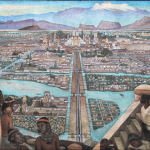In Matthew, Jesus is portrayed as a wisdom teacher who taught in parables and proverbs. Matthew also portrays Jesus as Wisdom in person, heavenly Wisdom herself. Matthew and Luke borrow sayings and parables from a source scholars call the Q document. It views Jesus as a messenger and teacher of wisdom. Matthew changes the wording in some of the sayings to put wisdom' words on Jesus' lips, identifying Jesus with Wisdom herself. (Compare Mt. 23:34 and Lk. 11:49.) In Matthew 23:34 Jesus identifies himself with Wisdom when he says "I send you prophets, sages, and scribes, some of whom you will kill and crucify . . ."
Some People Are Just Never Satisfied
Matthew 11:16-19 describes two messengers of Wisdom, John and Jesus. "This generation" (11:16) refers to contemporaries of Jesus who refused to believe he was the Messiah. Some people will not respond to any appeal. John was a preacher of repentance and an ascetic. He threatened the practices of those in power. He wailed and the people would not repent and mourn. And he was put to death.
Jesus was a preacher of grace as well as repentance. He healed on the Sabbath and ate with sinners. He brought the opportunity for wholeness and joy and inclusion. He played the flute for them and they would not dance. And he was put to death.
In the presence of John we should repent. Instead we condemn his stern asceticism and reject his appeal. In the presence of Jesus we should rejoice. Instead we reject Jesus and slander his pleasure in life.
We will not enter the game. We will not play. Neither the ascetic behavior of John nor the ebullience of the Son of Man can break through our conscious will to resist Jesus' message and identity. Nothing pleases us. (From The New Century Bible Commentary on Matthew by David Hill, p. 202. Note: I changed the historical reference from "the Jews" to "we" and "us" to see how it rings true for us today.)
We refuse the kind of introspection that leads to repentance. And we thereby miss the abundant life that lies on the other side.
Notice the "Deeds"
"Wisdom is vindicated by her deeds"(11:19). Just because we ignore Wisdom's invitation to a life of repentance and joy doesn't negate the validity of that invitation, the integrity and power of the life to which it leads. Jesus' identity is vindicated in the acts and signs that demonstrate that the inbreaking presence of the kingdom of God. When the disciples of John the Baptist in 11:4-6 come asking about who he is, Jesus tells them, "Go and tell John what you hear and see: 'the blind receive their sight, the lame walk, the lepers are cleansed, the deaf hear, the dead are raised, and the poor have good news brought to them. And blessed is anyone who takes no offense at me." Wisdom is vindicated by her deeds.
Jesus pronounces woes on the cities of Chorazin, Bethsaida, and Capernaum because they have failed to respond to the deeds of power he has done there (11:20-24).
You Have to Lay Your Burden Down
"Come to me you who labor and are carrying heavy burdens, and I will give you rest. Take my yoke upon you and learn from me; for I am gentle and humble in heart and you will find rest for your souls. For my yoke is easy, and my burden is light" (11:28-30).
The background to this text is found in the Wisdom of Jesus ben Sirach, a book written by a Jewish scribe in around 125 B.C.E. The author invites people to study the law with these words:
Put your necks under her yoke, and let your soul accept her burden. See, I have worked but little and found much rest.
"The yoke of the law" is a common phrase in rabbinic writings. Jesus was not so much criticizing the law itself, but the scribes who load people down with burdens hard to bear (Lk. 11:46; Mt. 23:4).
"You who labor and are carrying heavy burdens"refers to those who have lost the spirit of the law (constant gratitude to and mindfulness of God) in the letter—believing that adherence to a multitude of precepts and commandments constitutes righteousness.
"I will give you rest." (See Mt. 12:43; Rev. 6:11, 14:13.) The rest is both future and immediate. It could also be rendered "I will refresh you." In the kingdom of God, the faithful find rest.
"Take my yoke upon you . . ." The yoke of Jesus is humility and concern for the despised.
"I am gentle and lowly of heart." This echoes the description of the Servant of the Lord in Isaiah 42:2f and 53:1f.
"And you will find rest for your souls." This rest is not inner contentment and inactivity. It comes from returning to God and faithfulness to God's will. The disciple takes on the yoke of Christ and learns to become gentle and lowly himself in the process. (Hill, 206-209)
In order to answer Jesus' invitation to participate in his deeds of power and his life of joy, we have to lay down certain burdens that we have mistaken for blessings.





